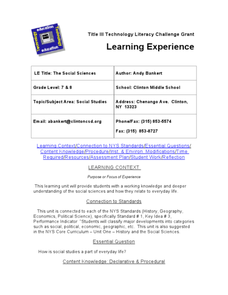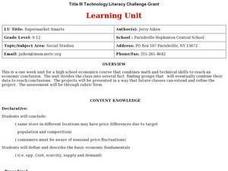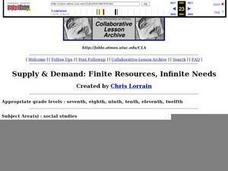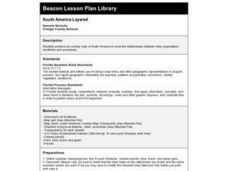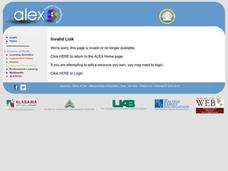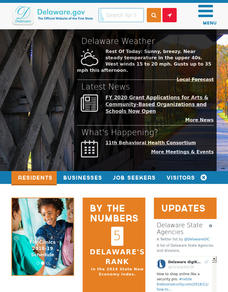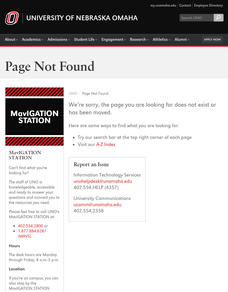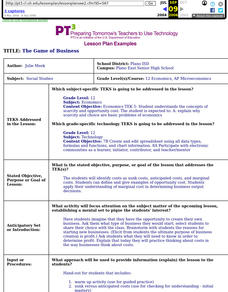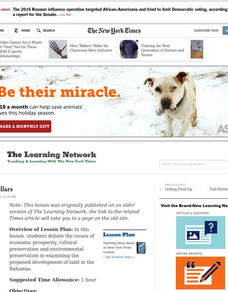Curated OER
Identify the Three Economic Sectors
Students identify the three economic sectors found in the United States. They organize different foundations into these three categories. They examine why each sector is necessary in our society.
Curated OER
All About Money Curriculum
Students participate in different pre-lessons to examine the role of individuals and neighborhoods. They also discover the role of the IMF and nations around the world.
Curated OER
Money Matters Curriculum
Learners complete a concept map on how money matters in our society. They use the internet to discover an online exhibit about money. They also complete a concept map.
Curated OER
The Social Sciences
Students search for examples of social science in and around their school. They create a Social Science scrapbook of the eight social sciences, that includes news articles and summaries that focus on each social science area.
Curated OER
Supermarket Smarts
Students examine how a consumer can make informed choices. They visit stores with a prepared shopping list, record the prices on a spreadsheet, create graphs, and create a Powerpoint presentation comparing the total cost of stores and a...
Curated OER
Saving, Investing and the Invisible Hand
Students determine how the financial institutions of a market economy help channel savings to economic investment. They complete worksheets based on a teacher-led demonstration.
Curated OER
Lemonade Stand: Making Money the Old-Fashioned Way
Pupils run their own lemonade stand and are to figure out what to sell the lemonade at to gain the maximum profit.
Curated OER
Scarcity and Choice
High schoolers participate in a role play as producers of two goods, allowing students to experience scarcity. They make choices about using their scarce resource to produce both or one of two goods. Then they construct...
Curated OER
Supply & Demand: Finite Resources, Infinite Needs
Learners discuss conflict resolution strategies they use in real life. They listen to "Getting to Yes" about principled negotiation. They negotiate the distribution of goodies on a table according to rules and time constraints. They...
Curated OER
Gold or Silver? Jim Crow at the Panama Canal
Students examine the system of Jim Crow used in the Panama Canal zone until the mid-1950s. Teams investigate the impact it has had on quality of life of workers and make presentations
Curated OER
You Can't Always Get What You Want!
Learners examine the concepts of supply and demand. They watch a video, research and identify the effect of fads, and complete the worksheet, Fads of the Last 100 Years.
Curated OER
South America Layered
Seventh graders create an overlay map of South America. They show the relationships between population, landforms and economies with their maps.
Alabama Learning Exchange
Goods and Services
First graders demonstrate the difference between goods and services.
Curated OER
Introduction to Economics
Pupils demonstrate an understanding of the concepts of unlimited wants and limited resources. They participate in an activity using money to purchase goods and services. Students evaluate benefits and costs resulting from personal choices.
Curated OER
Opportunity Cost
Pupils study what opportunity cost is and why it is important to their lives.
Curated OER
Why Did Delawareans Use Slaves?
Students read about an indentured servant, and complete a chart comparing slaves and indentured servants.
Curated OER
Math Problems: Recycling Economics
Students use recycling as an example to study the economics of business, and to find fixed and variable costs.
Curated OER
The Inflation Game
Twelfth graders explore the goals of economic growth, stability, full employment, freedom, security, equity, and efficiency as they apply to US economic policy. They is expected to analyze how economic growth, stability, and full...
Curated OER
Economics and Literature
Young scholars discuss capital resources and the types of machines their families use at home. They discuss how these machines increase productivity, and how these concepts connect to the law of demand and capital invention.
Curated OER
The Market Power Game
Students play a game to evaluate the power of competition in the four types of market structures. They describe characteristics and give examples of pure competition, monopolistic competition, oligopoly, and monopoly.
Curated OER
The Game of Business
Pupils practice the economic concepts of scarcity and opportunity cost. They imagine creating their own businesses and brainstorm what they need to know in order to determine when the business is profitable.
Curated OER
The Power Behind the Throne
Students choose a professional field of interest, consider what modern day or historical figure they would most like to assist, research the economy & its effect on support staff/entry-level jobs in that field, and create a strategy...
Curated OER
Sand Dollars
Students debate the issues of economic prosperity, cultural preservation and environmental preservation by examining the development of land in the Bahamas.
Curated OER
Bang for Your Buck
Students explore reasons for making a particular purchase and examine one strategy Wal-Mart stores used to keep prices low. They research and compare two companies that make similar products using different business philosophies.





